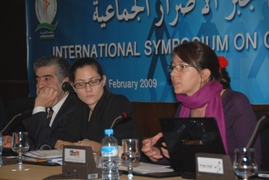International Seminar on Community Reparation in Rabat
The Advisory Council on Human Rights (CCDH) and the International Center for Transitional Justice (ICTJ) organized an international seminar on community reparation, on February 12 -14, 2009 in Rabat.The seminar was an opportunity for participants from different countries (Peru, Columbia, Liberia, Indonesia-Aceh, Sierra Leon, East Timor…), who are directly involved in the reparation programs, to share their field experiences, discuss the good practices as regards community reparation and generate new ideas to face the different challenges raised by these programs.
The purpose of this meeting was to analyze the different perceptions of community reparation depending on the socio-cultural and political particularities, share the gains, methods and practices and confront them to the reality of other social, economic and cultural contexts, consolidate local capacities and expertise of both government bodies and civil society on the development and implementation of measures of collective or community reparations.
Having spoken at the opening of this event, Mr. Ahmed Herzenni, the CCDH President, said that Morocco has made significant progress in community reparation. He stressed that the implementation of this program, recommended by the IER, covered eleven regions of the Kingdom (Al Hoceima, Casablanca-Hay el-Mohammadi, Ouarzazate, Er-Rachidia, Figuig, Khenifra, Khemisset, Nador, Zagora, Azilal, Tan-tan).

It is worth mentioning that the program aims to preserve history and collective memory, through the establishment of a method that focuses on three approaches: the free initiative and participation in decision making, the promotion of citizenship through active participation of local actors, and the definition of strategic needs of different social groups, particularly women.
Meanwhile, the CJT reparation program director, Ms. Lise Magarell, deemed it important to hold further meetings to exchange experiences among countries in the field of community reparation.
She stressed that this seminar would enable participants to explore the challenges posed by the conception and implementation of these programs in social, economic and cultural contexts.






















